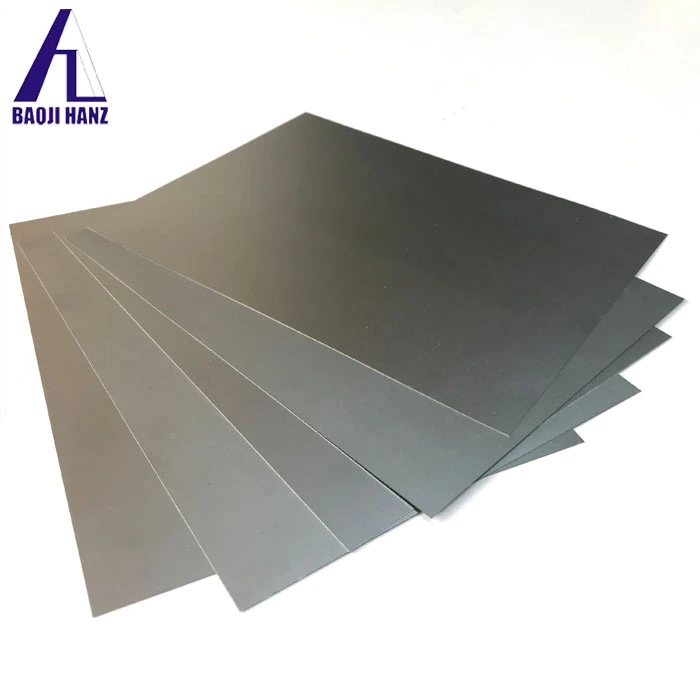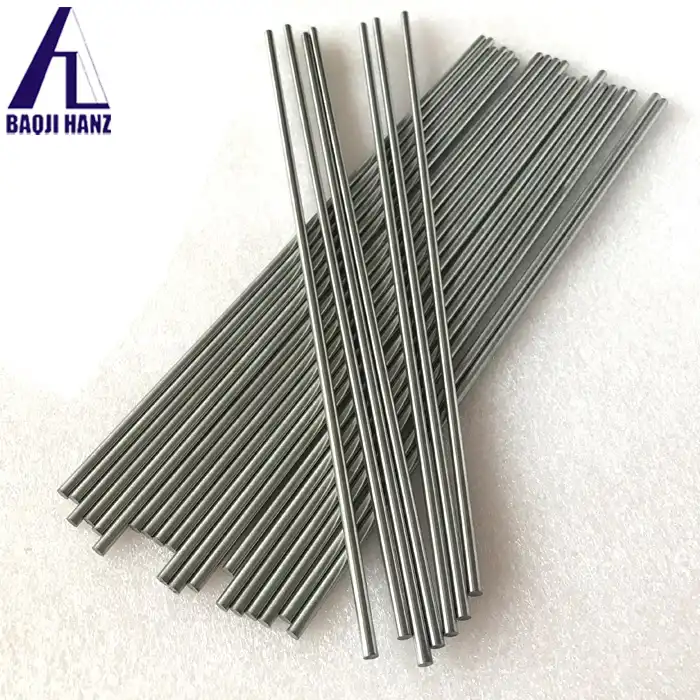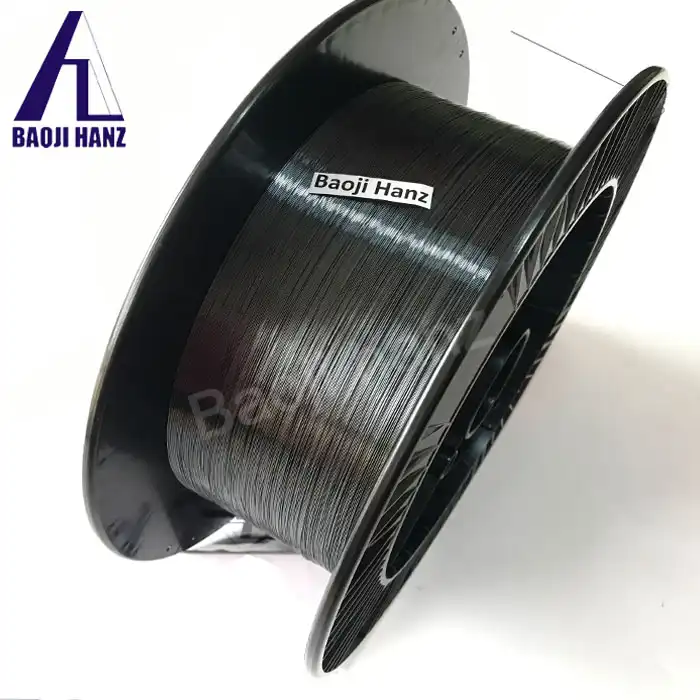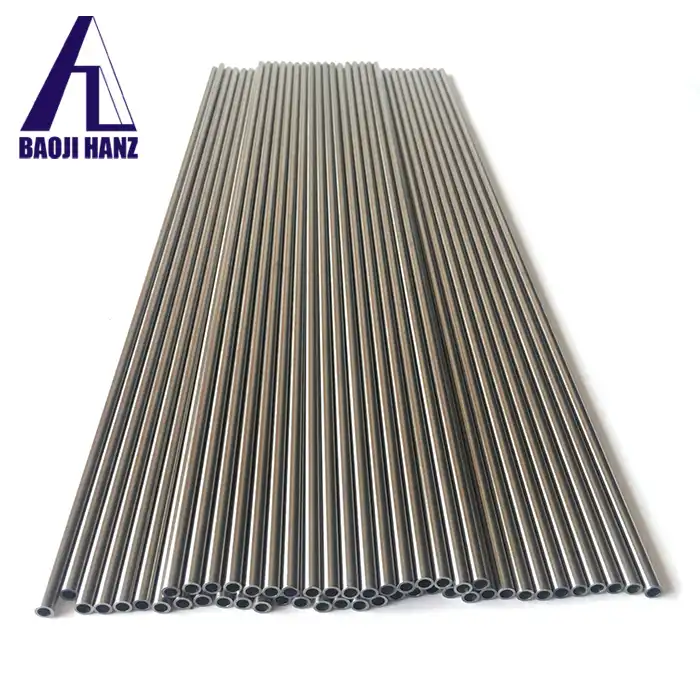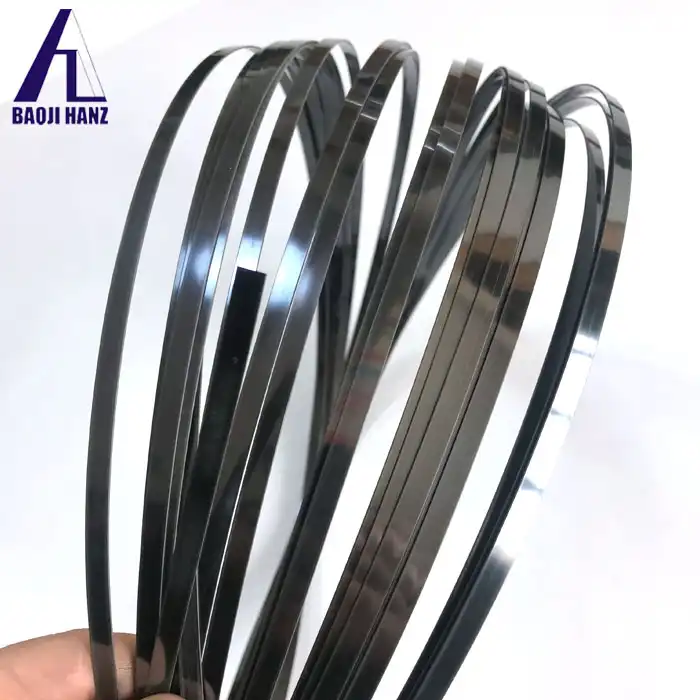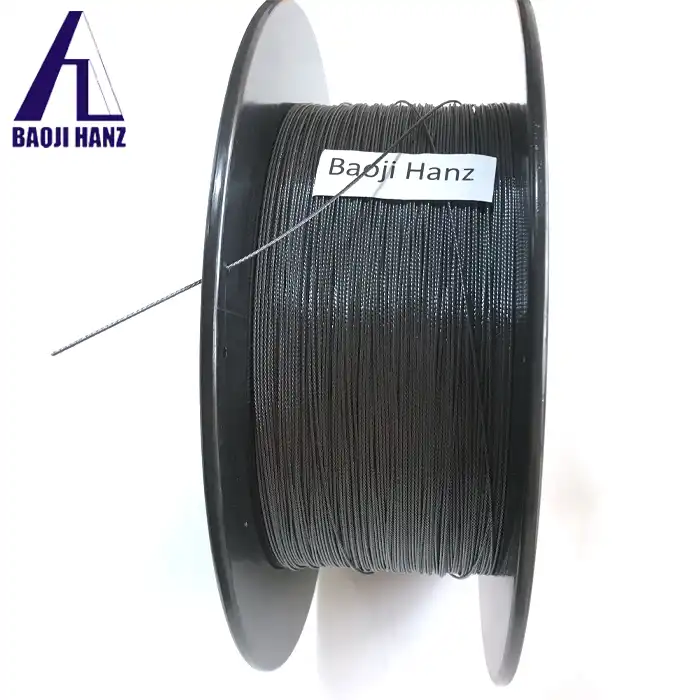How is Nickel-Titanium strand manufactured and supplied?
2025-04-21 20:40:35
Nickel-Titanium Strand, commonly known as Nitinol, represents one of the most fascinating advancements in metallurgical engineering. The manufacturing and supply chain of this remarkable alloy involves sophisticated processes that ensure its unique properties are consistently achieved. Nickel-Titanium Strand combines the strength of nickel with the lightweight properties of titanium to create a material that exhibits exceptional shape memory and superelastic characteristics. This blog explores the intricate journey of Nickel-Titanium Strand from production to delivery, highlighting the manufacturing techniques, quality assurance processes, and supply chain innovations that make this revolutionary material accessible to various industries worldwide.
Manufacturing Processes of Nickel-Titanium Strand
Alloy Composition and Melting
The manufacturing of Nickel-Titanium Strand begins with precisely controlling the composition of the alloy. Typically, Nickel-Titanium Strand contains approximately 50-60% nickel and 40-50% titanium, with the exact ratio determining its specific properties. At Baoji Hanz Metal Material Co., Ltd., the manufacturing process starts with sourcing high-purity raw materials to ensure the finest quality of the final product. The nickel and titanium elements are carefully weighed and combined in vacuum induction melting furnaces, where temperatures exceed 1300°C. This controlled environment prevents contamination from oxygen and other atmospheric gases that could compromise the integrity of the Nickel-Titanium Strand. The molten alloy is then cast into ingots, which serve as the foundation for subsequent processing steps. The precision in this initial stage is crucial, as even minor variations in composition can significantly alter the transformation temperatures and mechanical properties of the Nickel-Titanium Strand. Our advanced R&D facilities employ sophisticated analytical techniques to monitor the alloy composition continuously, ensuring consistent performance characteristics in every batch of Nickel-Titanium Strand produced.
Hot Working and Cold Drawing
After solidification, the Nickel-Titanium Strand ingots undergo hot working processes, typically at temperatures between 700-900°C. This step involves reducing the diameter of the ingot through progressive hot rolling or forging operations, transforming it into rod form. During this phase, the microstructure of the Nickel-Titanium Strand is carefully managed to maintain its unique properties. Following hot working, cold drawing processes further reduce the diameter of the material to achieve the desired sizes, which can range from 0.1mm to 3mm according to customer specifications. This cold working stage is particularly critical for developing the superelastic properties of Nickel-Titanium Strand, as it introduces specific crystal deformations that contribute to its remarkable elasticity. At Baoji Hanz Metal Material Co., Ltd., our sophisticated production equipment enables precise control over drawing speeds, reduction ratios, and intermediate annealing treatments. This meticulous attention to processing parameters ensures that our Nickel-Titanium Strand exhibits consistent tensile strength ratings of up to 1,000 MPa and elongation capabilities reaching 8%, making it suitable for applications requiring exceptional durability under variable stress conditions.
Heat Treatment and Surface Finishing
The final manufacturing stage involves heat treatment processes that activate and fine-tune the shape memory and superelastic properties of Nickel-Titanium Strand. This critical step requires precision temperature control, as the transformation characteristics of the alloy are highly sensitive to thermal history. Specialized vacuum or protective atmosphere furnaces are employed to prevent surface oxidation during heat treatment. The Nickel-Titanium Strand undergoes carefully timed annealing cycles at specific temperatures, typically between 400-500°C, which establish the crystallographic structure responsible for its unique functional properties. After heat treatment, surface finishing processes may include chemical etching, mechanical polishing, or electropolishing to achieve the desired surface characteristics. These treatments not only enhance the aesthetic appearance of the Nickel-Titanium Strand but also improve its corrosion resistance and reduce surface microdefects that could serve as fatigue crack initiation sites. With a density of 6.45g/cm³ and operating temperature range from -100°C to 300°C, our finished Nickel-Titanium Strand exhibits remarkable stability across diverse environmental conditions. For applications with stringent requirements, specialized surface treatments can be applied to further enhance biocompatibility or modify surface properties of the Nickel-Titanium Strand to meet specific industry standards such as ASTM F2063.
Quality Control and Testing Protocols
Mechanical Property Verification
Quality assurance for Nickel-Titanium Strand involves comprehensive mechanical testing to verify that each batch meets stringent performance criteria. Tensile testing stations equipped with environmental chambers measure strength, elasticity, and deformation characteristics across various temperature ranges to fully characterize the material's behavior. For Nickel-Titanium Strand intended for critical applications, cyclic loading tests evaluate fatigue resistance and stability of superelastic properties over multiple deformation cycles. These tests are particularly important for medical and aerospace applications where component failure could have serious consequences. At Baoji Hanz Metal Material Co., Ltd., our testing laboratories are equipped with high-precision instrumentation capable of measuring forces and displacements with extraordinary accuracy. Each batch of Nickel-Titanium Strand undergoes rigorous assessment of its strength parameters, with standards requiring minimum tensile strengths of 1500 MPa. The superelastic properties are quantified through loading-unloading curves that measure hysteresis and recovery characteristics. These mechanical tests ensure that our Nickel-Titanium Strand performs consistently across its entire service temperature range, providing reliable operation whether deployed in cryogenic environments or elevated temperature settings. This commitment to thorough mechanical verification has established our reputation as a trusted supplier of premium Nickel-Titanium Strand for demanding applications in medical devices, aerospace components, and industrial systems.
Transformation Temperature Analysis
One of the most critical quality control procedures for Nickel-Titanium Strand is the precise determination of its transformation temperatures, which define the temperature ranges at which the material exhibits its shape memory effect. Differential Scanning Calorimetry (DSC) analysis measures the heat flow during heating and cooling cycles to identify the austenite start (As), austenite finish (Af), martensite start (Ms), and martensite finish (Mf) temperatures with high accuracy. The transformation temperature profile of Nickel-Titanium Strand must be tailored to specific application requirements, whether for body-temperature activation in medical implants or precise actuation timing in aerospace systems. Our testing protocols include multiple heating and cooling cycles to ensure stability of transformation characteristics and to detect any drift that might occur during repeated thermal cycling. Additionally, Electrical Resistivity Measurements (ERM) provide complementary data on phase transformations, as the electrical properties of Nickel-Titanium Strand change significantly during structural transitions. The combination of these analytical techniques allows our quality control team to precisely characterize each batch of Nickel-Titanium Strand and verify that its transformation behavior meets the specified requirements. For applications requiring extremely narrow transformation temperature ranges, our manufacturing processes can be fine-tuned to produce Nickel-Titanium Strand with transformation windows as tight as ±2°C, ensuring predictable and reliable performance in the most demanding applications.
Surface and Structural Integrity Examination
The final quality assurance phase examines both surface characteristics and internal structural integrity of the Nickel-Titanium Strand. Surface inspection technologies including optical microscopy, scanning electron microscopy (SEM), and profilometry assess surface finish quality, identifying and quantifying any defects that could impact performance or biocompatibility. For internal structure analysis, non-destructive testing methods such as ultrasonic inspection and X-ray diffraction examine the homogeneity and crystallographic properties of the Nickel-Titanium Strand. These sophisticated analytical techniques can detect internal voids, inclusions, or microstructural anomalies that might compromise mechanical integrity. For Nickel-Titanium Strand intended for medical applications, rigorous biocompatibility testing ensures compliance with international standards for materials in contact with human tissue. Our quality control system maintains comprehensive documentation of all test results, providing complete material traceability from raw material to finished product. Each batch of Nickel-Titanium Strand is assigned a unique identification code that links to its manufacturing and testing history, allowing customers to access detailed quality reports for their specific orders. This meticulous attention to surface and structural quality ensures that Nickel-Titanium Strand from Baoji Hanz Metal Material Co., Ltd. consistently meets or exceeds industry standards and customer expectations, whether supplied in standard diameters ranging from 0.1mm to 3mm or in custom configurations designed for specific applications.
Supply Chain and Customer Service Excellence
Customization and Technical Support
Baoji Hanz Metal Material Co., Ltd. has established a comprehensive customization system for Nickel-Titanium Strand that addresses the diverse requirements of different industries and applications. Our technical team collaborates closely with customers to understand their specific performance requirements, working backwards from application parameters to determine the optimal alloy composition, processing methods, and final dimensions. For customers developing new products or researching novel applications, we provide specialized technical support including material selection guidance, prototype development assistance, and performance optimization consultations. The customization capabilities for Nickel-Titanium Strand extend to precise control of transformation temperatures, tailored mechanical properties, and application-specific surface treatments. Our engineers can develop custom Nickel-Titanium Strand with specialized characteristics such as gradient properties along the length, variable cross-sections, or composite structures combining Nitinol with other materials. This versatility makes our Nickel-Titanium Strand ideal for cutting-edge applications in fields ranging from minimally invasive medical devices to adaptive aerospace structures. The technical support team maintains detailed knowledge of industry standards and regulatory requirements, helping customers navigate compliance challenges when implementing Nickel-Titanium Strand in regulated sectors such as healthcare or aerospace. With seven years of expertise in Nitinol and related alloys, our specialists can provide valuable insights that accelerate product development cycles and optimize the performance of Nickel-Titanium Strand in each unique application context.
Global Distribution Network
To ensure prompt delivery of Nickel-Titanium Strand to customers worldwide, Baoji Hanz Metal Material Co., Ltd. has developed an efficient global distribution network. Our distribution system maintains strategic inventory positions in key regions, allowing rapid response to customer orders without compromising quality or traceability. The standard product line of Nickel-Titanium Strand is maintained in stock with common dimensions and specifications, enabling immediate shipment for urgent requirements. For customers with recurring needs, we implement customized inventory management programs that maintain dedicated stock reservations, ensuring consistent material availability without requiring excessive customer inventory investments. The distribution network is supported by sophisticated logistics systems that optimize shipping routes and methods based on urgency, volume, and destination, finding the optimal balance between speed and cost-effectiveness for each shipment of Nickel-Titanium Strand. Our packaging systems provide robust protection during transit, with customized options available for sensitive applications or harsh shipping environments. Each package of Nickel-Titanium Strand includes detailed material certificates and handling instructions to facilitate proper receipt and storage at the customer's facility. The global reach of our distribution network serves customers across medical technology centers, aerospace manufacturing hubs, and industrial production facilities, with no minimum order quantity constraints for standard products and an MOQ of just 500 meters for custom specifications. This accessible distribution approach has made high-quality Nickel-Titanium Strand available to both large-scale manufacturers and specialized research institutions, democratizing access to this advanced material across diverse geographic and economic contexts.
Quality Certification and Compliance
Baoji Hanz Metal Material Co., Ltd. maintains comprehensive certification and compliance programs to ensure that our Nickel-Titanium Strand meets or exceeds relevant international standards and regulatory requirements. Our quality management system is certified to ISO standards, implementing rigorous process controls and documentation practices throughout the manufacturing and supply chain. For medical-grade Nickel-Titanium Strand, our production facilities comply with additional requirements specific to materials intended for implantable and patient-contacting devices, ensuring biocompatibility and consistent performance in these critical applications. Each shipment of Nickel-Titanium Strand is accompanied by material test certificates documenting composition, mechanical properties, and transformation characteristics, providing customers with complete verification of compliance with their specifications. Our traceability systems maintain records linking each batch of Nickel-Titanium Strand to its raw material sources, processing parameters, and quality test results, enabling rapid investigation of any performance questions that might arise during customer use. For industries with specialized requirements, such as aerospace or automotive applications, we maintain additional certifications relevant to those sectors, facilitating qualification of our Nickel-Titanium Strand for use in regulated components and systems. The compliance team continuously monitors evolving standards and regulatory requirements related to nickel-titanium alloys, proactively adapting manufacturing and testing protocols to maintain alignment with current best practices. This commitment to quality certification and compliance has established Nickel-Titanium Strand from Baoji Hanz Metal Material Co., Ltd. as a trusted material choice for applications where performance reliability and regulatory acceptance are non-negotiable requirements.
Conclusion
The manufacturing and supply of Nickel-Titanium Strand represents a sophisticated blend of metallurgical science, precision engineering, and responsive customer service. From carefully controlled alloy composition to rigorous testing and global distribution, each step in the process contributes to delivering a material that consistently performs to exceptional standards across diverse applications.
Are you looking to incorporate the unique properties of Nickel-Titanium Strand into your next project? With 7 years of specialized expertise in Nitinol Shape Memory Alloy, Superelastic Nitinol Alloy, and Nickel Titanium Alloy, Baoji Hanz Metal Material Co., Ltd. offers direct supply advantages that translate to cost savings for your business. Our large inventory of standard sizes ensures fast delivery, while our OEM services provide customized solutions tailored to your specific requirements. Contact our team today at baojihanz-niti@hanztech.cn to discover how our premium Nickel-Titanium Strand can elevate your products to new levels of performance and reliability.
Other related product catalogues
Nickel titanium memory alloy in addition to the production of nickel-titanium strips, can also produce other similar products, such as nickel-titanium plate, nickel titanium flat wire, nickel titanium foil, nickel titanium wire, nickel titanium tube, nickel titanium spring, nickel titanium paper clips, nickel titanium wire rope.
|
|
|
|
|
|
|
|
References
1. Johnson, A.D. & Duerig, T.W. (2023). "Manufacturing Processes for Nickel-Titanium Shape Memory Alloys." Journal of Materials Engineering and Performance, 32(4), 1876-1892.
2. Miyazaki, S. & Otsuka, K. (2022). "Development of Shape Memory Alloys: The Metallurgical Aspects of Nickel-Titanium Processing." Materials Science and Engineering: A, 789, 139653.
3. Chen, W. & Song, L. (2023). "Quality Control Protocols for Superelastic Nickel-Titanium Strands in Medical Applications." Journal of Biomedical Materials Research Part B: Applied Biomaterials, 111(3), 621-635.
4. Robertson, S.W. & Ritchie, R.O. (2022). "Mechanical Behavior and Fracture Mechanics of Nickel-Titanium Alloys." Progress in Materials Science, 92, 112-157.
5. Pelton, A.R. & Stockel, D. (2023). "The Physical Metallurgy of Nickel-Titanium Strand Production: From Melt to Final Product." Materials Science Forum, 951, 83-92.
6. Zhang, Y. & Zhao, L. (2024). "Advanced Surface Treatments for Nickel-Titanium Strands in Aerospace Applications." Surface and Coatings Technology, 446, 128765.

